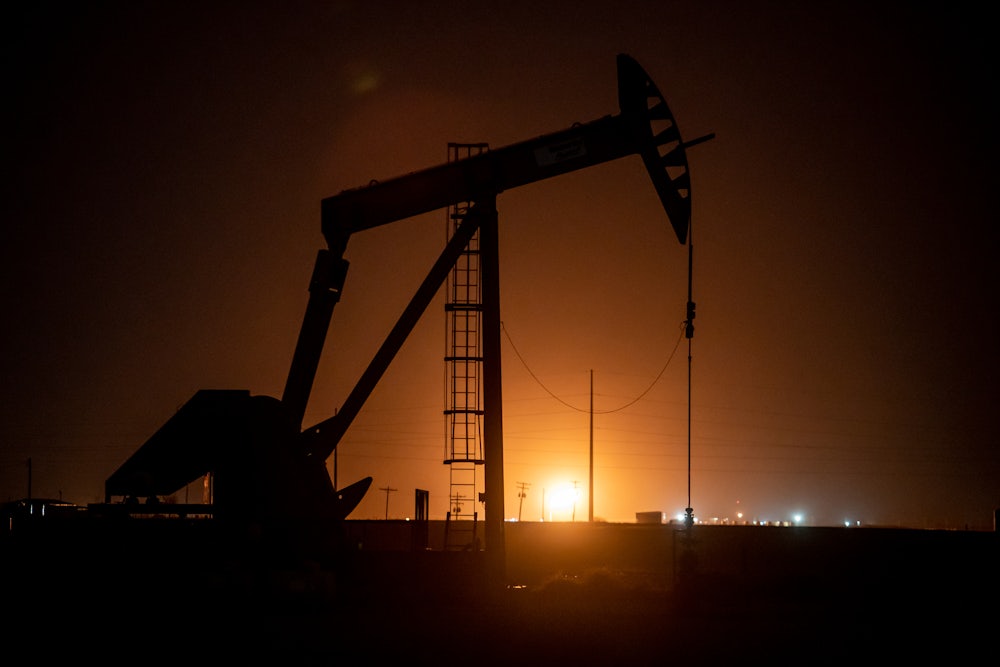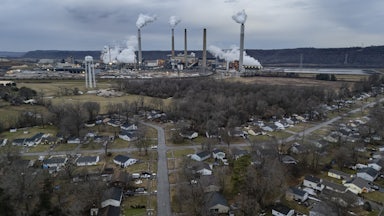In announcing a deal to acquire shale driller Pioneer Resources for $60 billion, ExxonMobil last week initiated the year’s biggest corporate buyout, which is also the company’s biggest such transaction since 1999. Pioneer Resources exists for a single reason: to drill for oil and gas. Exxon’s purchase is an indication that it intends to keep doubling down on exactly that, continuing the trend of major oil and gas companies walking back climate commitments made when they were making less money on their core business. By 2027, according to Bloomberg, Exxon now plans to produce two million barrels per day in the Permian Basin.
The takeover could be the start of a long-awaited wave of consolidations in the U.S. shale sectors, where smaller producers who made their name in the shale boom’s last decade of spending binges are being pressured to cut costs, pay down debts, and deliver more money to their shareholders. The Exxon-Pioneer deal, though, still needs to receive the blessing of the Federal Trade Commission, charged with policing antitrust violations.
The agency has yet to put a stop to smaller consolidations in the energy sector. It has pushed back timelines and set some conditions for previous mergers and acquisitions, like requiring some companies to sell off certain assets or give up board seats. Antitrust experts interviewed by Reuters were skeptical that the FTC would try to block the deal, which would turn Exxon into the largest driller in the Permian Basin.
Legality of corporate consolidations aside, the buyout is a troubling indication that the industry sees little reason to change course. Despite the rapid growth of solar power, especially, global fossil fuel usage hasn’t really budged. Even as renewables expanded by 13 percent last year, emissions from the power sector continued to rise. Fossil fuels still account for roughly 82 percent of global energy consumption. The United States, meanwhile, has never produced more crude oil: Domestic production reached a record high during the first half of 2023, and global prices continue to climb. (One of the reasons Exxon was able to make the Pioneer purchase, which was an all-stock deal, was because it posted record profits last year.) As a recent Oil Change International report found, the U.S. is also responsible for one-third of all global fossil fuel expansion planned through 2050.
The fact that oil and gas companies have little reason to fear that policymakers are about to crack down on their business model doesn’t mean they don’t see threats on the horizon. Legal challenges against the industry over its role in fueling the climate crisis have mounted over the last several years. Last month, California became the world’s largest economy to take on oil producers in this way, alleging in court that Exxon, Chevron, Shell, ConocoPhillips, BP America, and the American Petroleum Institute—a trade association—misled the public about the dangers of burning fossil fuels. As investigative journalists and academics have shown, Exxon’s corporate forerunners sponsored research into global warming as early as the 1960s before going on to fund efforts undermining the scientific consensus on climate change.
Oil companies are now battling to get climate liability suits thrown out entirely. Last week, federal prosecutors found that documents recovered through a five-year hacking operation that targeted climate activists were used to undermine investigations into ExxonMobil’s knowledge of the climate crisis. In 2022, the U.S. Attorney General’s Office charged Israeli private investigator Aviram Azari of taking $4.8 million from unnamed corporate clients to carry out an “intelligence gathering” operation against individuals and organizations; hackers Azari hired used spear-fishing operations to gain access to the private accounts of environmentalists and other Exxon critics. ExxonMobil wasn’t accused of hiring Azari, and the company has denied any knowledge of his activities.
As the Center for Climate Integrity’s Emily Sanders reported, the company this week did quietly take down a web page rebutting critics, which accused them of attempting to “delegitimize ExxonMobil by misrepresenting our position on climate change and related research to the public.”
Much has been made in the business press of what oil companies will do with their excess profits. The White House instructed the FTC in 2021 to look into whether there was evidence that they were price gouging, pointing to Exxon and its record profits, in particular. Since then, price gouging has become less of a focus for the administration as it’s focused more on encouraging companies to ramp up production.
For the last few years, the trend for U.S. producers has been toward fiscal discipline: to stop burning through investor cash, deliver big payouts, and look toward the long-term stability of corporate balance sheets. To the administration’s ire, that’s meant pouring excess cash not into boosting production so as to lower prices, but to keeping shareholders happy. If consolidation becomes the norm, ever-growing companies will also have deeper pockets to keep fighting off their critics and—potentially—find it even easier to coordinate political influence among a smaller cast of top executives.










